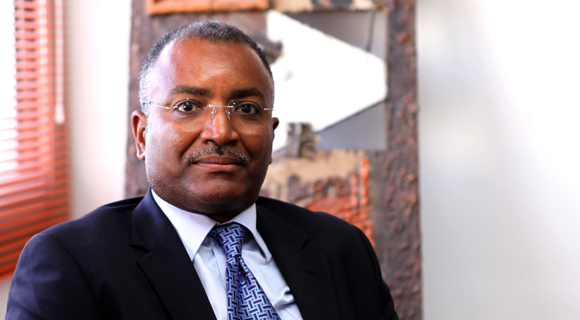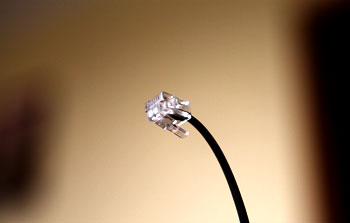Internet Access in Africa: Leading Provider of ICT Solutions in Africa
Louis Diakité, Chief Executive Officer of Alink Telecom
Alink Telecom is a telecom operator and provider of internet access in Africa. Alink Telecom provides internet access and other services to top +100 companies of Côte d’Ivoire – banks, insurance companies, and oil and gas companies among others.
Interview with Louis Diakité, Chief Executive Officer of Alink Telecom

The minister of post and ICT wants to transform Côte d’Ivoire into a knowledge economy within the next ten years. Given that the economy is still dependent on agriculture, do you think this project is feasible?
I do think this project is feasible, but there are many steps we must complete before we are able to achieve our goals, like reforming the Internet sector and by opening the communications sectors. To do so, the government has to make certain reforms. Politically and in terms of regulation, there is some work to be done. For example, today the Internet is not free. By free, I mean that we, in Côte d’Ivoire, depend on a unique sub tree connectivity. This sub tree connectivity is a monopoly of one private company. All the country Internet access has been sold to one single company.
Do you think the government is going to tackle the issue and open up the connection to other companies?
Well, I cannot answer this question. As far as I know, we must go through this private company to get Internet access. Today the government is not regulating the prices, making companies such as Alink dependent upon the goodwill of this entity.

There are 15 to 16 million mobile subscribers in Côte d’Ivoire, but the penetration of the Internet has been lagging behind. What is the current situation?
The mobile has a potential of 20% growth per annum in all western African countries. In 1993, in Benin, our group was the first to install a mobile network in West Africa, along with Benin opity.
The mobile growth is considerable, however, the telecom market in Côte d’Ivoire is a peculiar one. With 5 active mobile operators and 7 GSM licenses, the market is over-liberalized, putting a pressure on the prices and benefiting the consumer. On the other hand, the Internet situation in Côte d’Ivoire is not a “free market“. The only way to considerably enhance the level of penetration of the Internet is to free the access to Internet.
What is the pricing compared to the neighboring countries? For instance, is it relatively high in Côte d’Ivoire as compared to Ghana?
Today, Ghana is a very competitive market; they are equipped with several cable landing. The result is that the price per megabyte in Ghana is very low. On the other hand, in Côte d’Ivoire, the price per megabyte is 40% to 60% more expansive. It would be cheaper renting fiber from Ghana instead of buying it locally in Côte d’Ivoire.
You are the CEO of Alink Telecom – a company that is present in many countries in Africa. Despite all the setbacks in Côte d’Ivoire, your headquarters is established here. Why is that?
Our company Alink Telecom is present in 14 countries in Africa. We are strategically spread across Africa and soon we will open in 4 new countries. We are mainly present in western and southern Africa and Tanzania.
Headquarters is settled in Côte d’Ivoire simply because I am Ivorian and the management team is based here. The management team can move anywhere if needed, but the growing market in Côte d’Ivoire has a considerable potential and we wouldn’t want to move the data and Internet business.
Alink Telecom is mainly in the B2B (Business to Business) market. We are not in the B2C market (Business to Consumer). We provide services to banks, insurance companies, and oil and gas companies. We are servicing to top +100 companies of Côte d’Ivoire, providing interconnection within the region to these companies. Furthermore, Côte d’Ivoire is the engine of growth in regions such as Germany and France for Europe. If the country is to reconcile its internal issues, the economic growth that would follow will be phenomenal.
… today, internet is not free. By free, I mean we, in Côte d’Ivoire, depend on a unique sub tree connectivity. This sub tree connectivity is a monopoly of one private company. All the country internet access has been sold to one single company.
Once the Internet market opens up, what are the particular investment opportunities in the ICT sector in Côte d’Ivoire?
If the ICT sector opens up, especially the Internet, there will be a considerable increase in the launching of start-up companies in Côte d’Ivoire. The situation will create a dynamic within the market. This development is happening in all West Africa.
As for the current situation, the main problem is access to Internet in Côte d’Ivoire. There are hardly any start-ups in Côte d’Ivoire even though the IT schools are very competent. Why? Because the government doesn’t free the access to the Internet and consequently, talented people choose to work abroad.
We need the start-up companies. We need people who will develop and create some added value services, new software and new applications. Our business today as Alink Telecom is to provide the data transmission, interconnection, IP transit, IP connectivity, and convergence. In addition, we are launching the cloud computing SAP.
Yet for the market to prosper, we need economic dynamics. By freeing the access to the Internet, the authorities will stimulate the creative abilities of medium sized companies. There is an enormous potential to develop IT services and applications that can be exported, to facilitate social and economic development in the rural areas, and to provide excellent local job opportunities to young people. It is happening in some other countries like Senegal. Why not here?
You are now present in 14 countries and you will be opening 4 more countries. Can you expose your plans and your international strategy?

Alink Telecom’s strategic priority is the cloud computing technology. We are focused on the convergent telecommunication. We provide to our customers a global solution on a renting basis, including telecom hardware and software instead of having to invest in Capex. Furthermore, we are starting a revolutionary transformation with SAP technology; Alink Telecom will be the first in west and sub-Saharan Africa to bring SAP as a cloud service. This will allow us to charge the customer per user base without having to pay for the license.
Are any of the companies interested in this particular service?
Yes. Today for example, customers who want SAP services have to contact the European companies, which is a complicated and very expensive service. By using our new cloud computing system they will be able to get SAP technology easier and at much lower cost.
Are you also planning to expand in other markets worldwide?
Our main market is Africa, which makes us focus only on internet access in Africa. Our biggest customers are established in the continent, like Ecobank, Ensia, an insurance company.
Our main goal is to connect Africa. I think there are a lot of things to do. The market is big so we need to service that market.
How does Africa compare to the neighboring economic regions?
Africa has a future in the global economy. The GCC market is smaller than the African market per say. I think that a lot of development is happening now in Africa. There are a lot of requests for investment in Africa; Africa is no longer considered as the poor market continent, rather there is a development trend and the continent has a bright future.
How would you explain this investment trend?

The development of our economy creates some needs. As the ITU report stated, each dollar invested in the telecom sector reduces the level of poverty in the country. Now we see the results. For example, opening up the mobile market has provided considerable growth to our local economies, thus creating jobs and adding value to our local economies.
The improvement is considerable. We just need to capitalize on that improvement and open the market to local talents and local investors.
What could hamper the ICT growth in Côte d’Ivoire?
If we omit the political situation of the country, the main danger is the monopoly of the market. If a monopoly is allowed in some sectors without strong regulation, the growth in the telecommunication sector will be endangered.
In Europe for example, they first started with a stronger relation and while evolving they produced drafts of usage conditions. That relation permitted to force the big companies to give access to smaller players.That was the case in Europe, and it helped to deal with the monopoly problems enabling a successful growth in the market.
Again, I would like to emphasize the importance of the access to the telecommunication sector. In Europe, if you want to have a service base on a mobile access, the regulators will oblige the GSM operator to provide unrestricted access for your platform.
The operators cannot deny the user access to the platform. In Côte d’Ivoire, this is not the case. Thus, they are reducing the number of developers in the field because they cannot develop their ideas. The GSM operators are treating the user in Côte d’Ivoire as their own property. Under normal conditions people should be able to access the platforms.
The regulators should permit us to access these platforms for the simple reason that they belong to the public. Depriving access to the user and to other Internet companies should not be permitted. We need to revise the telecom regulations of the African countries to make it more open and accessible. In addition, the 3G technology will hopefully spread the Internet access in Africa. I think and hope that the 3G technology will revive our markets.